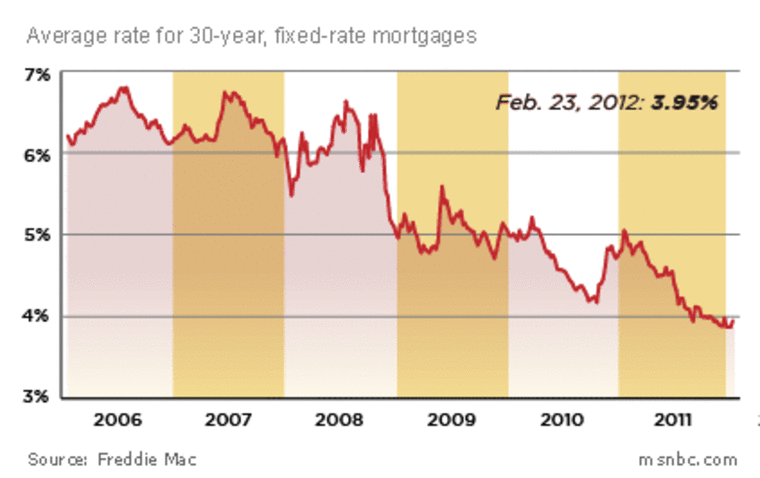With home prices battered by lagging sales and a slumping economy, this may seem like a good time to get a deal on real estate. But there’s a hitch: Mortgage rates are heading higher.
Rates on 30-year fixed-rate loans have risen to an average 6.45 percent, mortgage giant Freddie Mac said Thursday in its weekly report. That is up from from 5.98 percent just over a month ago.
Loans for 15-year, fixed-rate loans and five-year adjustable-rate loans also have risen lately, while one-year adjustable-rate loans, which are not suitable for many borrowers, have been roughly flat at about 5.25 percent.
Economists and rate-watchers say they’re not surprised that mortgage rates are inching up, especially as the bond investors who dictate long-term rates become more concerned about inflation. Bond investors demand higher rates to compensate for the potential effects of inflation.
Gus Faucher, director of macroeconomics at Moody’s Economy.com, said he expects to see 30-year fixed rates rise to 6.8 percent by the close of 2008 and to hit the 7 percent to 7.5 percent range by the close of 2009. Rates on adjustable mortgages, which are based on short-term Treasury security rates, may show a less dramatic increase, he said, moving from the low 5 percent range to about 5.5 percent during 2009.
“We’ve seen rates go up — both 30-year fixed and adjustable — since January,” Faucher said. “It makes it tougher for housing to recover. We’ll need to see steeper price cuts (on homes) to spur a recovery.”
“The wisdom now is that with the Federal Reserve basically done with rate-cutting, (mortageg) rates are just going to keep moving upwards over the next year or more,” said Guy Cecala, president of mortgage research firm Inside Mortgage Finance in Bethesda, Md.
Cecala said he hesitates to predict where rates will go, but if pressed he would expect 30-year fixed loans to climb into the 7 percent range in the coming 12 months.
Rising rates might not affect the housing market as much as one might expect, he said. After all, he notes, mosrtgage rates earlier this year were quite reasonable — hovering around 6 percent — and that did little to encourage buying activity, nor did it cushion vulnerable homeowners from losing money on homes with declining values.
“We haven’t seen the end of price reductions,” Cecala says, noting that it could be 2010 before prices begin climbing again.
Cecala says it’s hard to say what, exactly, could catalyze a housing recovery. However, he did say that if short-term interest rates — the sort used as a basis for determining adjustable-rate mortgages — were to rise, that could help the U.S. once again offer foreign investors attractive returns on mortgage-related investments.
Of course, some industry observers predict that rates won’t increase — and may actually fall as much as 100 basis points (or one percentage point) over the next six months.
Jeff Lazerson, president of Mortgage Grader in Laguna Niguel, Calif., says he expects rates on 30-year fixed mortgages to fall by the end of 2008 to the 5.25 percent to 5.5 percent range. He believes they will stay at those levels during 2009.
“We have a vicious cycle,” Lazerson says of the current economy. “The 30-year fixed rates will have to go down because the market is so anemic.”
But Lazerson expects home prices to keep sliding even longer than others — into 2010 — before beginning a slight upturn. He says other factors — such as a new president injecting optimism into the American populace — could play a role in the timing of a recovery, too.
“Something much bigger than interest rates changing will have to happen to change the market,” he says. “I see the economy getting worse, not getting better.”
